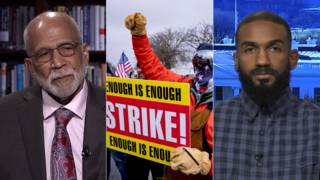
Related
Guests
- Steve ClemonsSenior Fellow at the New America Foundation, where he directs the American Strategy Program. He runs the popular blog TheWashingtonNote.com
- Stephen ZunesProfessor of Politics and International Studies at the University of San Francisco, where he chairs the program in Middle Eastern Studies. He is a senior policy analyst for the “'Foreign Policy in Focus'” project of the Institute for Policy Studies. His most recent article is titled Biden, Iraq, and Obama’s Betrayal
Much of the focus of Sen. Obama’s selection of Biden to be his running mate has centered on his foreign policy experience. Biden serves as the chairman of the powerful Senate Foreign Relations Committee. In 2002, he helped push through a Senate resolution authorizing the invasion of Iraq. He has since become a persistent critic of President Bush’s policies in Iraq and the so-called troop surge. [includes rush transcript]
Transcript
AMY GOODMAN:
Barack Obama’s announcement of Senator Joseph Biden to be his running mate came early on Saturday morning, just two days before the opening day of the Democratic National Convention. His selection capped weeks of speculation and punditry over who would serve as the Democrat’s vice-presidential nominee.
The sixty-five-year-old Biden has a long history in Washington politics, with more than three decades in the Senate. He was elected in 1972 at the age of twenty-nine, is the fourth-longest-serving Democratic senator in Congress.
Obama and Biden made their first joint appearance at an afternoon rally in Springfield, Illinois on Saturday at the old State Capitol, where Obama announced his candidacy almost two years ago. Speaking before a crowd of 35,000, Obama praised the Delaware senator’s experience.
SEN. BARACK OBAMA: Joe Biden is that rare mix. For decades, he’s brought change to Washington, but Washington hasn’t changed him. He’s an expert on foreign policy whose heart and values are firmly routed in the middle class.
AMY GOODMAN:
After Biden took to the stage, he wasted no time in using his platform to criticize presumptive Republican presidential nominee John McCain.
SEN. JOSEPH BIDEN: Ladies and gentlemen, your kitchen table is like mine. You sit there at night before you put the kids — after you put the kids to bed, and you talk, and you talk about what you need. You talk about how much you’re worried about being able to pay the bills. Well, ladies and gentlemen, that’s not a worry John McCain has to worry about. It’s a pretty hard experience: he’ll have to figure out which of the seven kitchen tables to sit at.
AMY GOODMAN:
In 2007, Biden competed against Obama for the presidential nomination. During his campaign, he once declared that Obama was not yet ready for the presidency. He also drew heavy criticism for a racially charged remark about Obama that he made while speaking to a reporter from the New York Observer.
SEN. JOSEPH BIDEN: We’ve got the first sort of mainstream African American who is articulate and bright and clean and a nice-looking guy. I mean, that’s a storybook, man.
AMY GOODMAN: But much of the focus of Obama’s selection of Biden to be his running mate has centered on his foreign policy experience. Biden serves as the chair of the powerful Senate Foreign Relations Committee. In 2002, he helped push through a Senate resolution authorizing the invasion of Iraq. He has since become a persistent critic of President Bush’s policies in Iraq and the so-called troop surge.
We spend the rest of the hour with a debate on Senator Biden’s foreign policy. Steve Clemons is senior fellow at the New America Foundation, where he directs American Strategy Program, runs the popular blog thewashingtonnote.com. His latest article in support of Biden is “Why Joe Biden is Vital and the Right Choice.” Steve Zunes is also with us, professor of politics and international studies at the University of San Francisco, where he chairs the program in Middle Eastern Studies. He’s the senior policy analyst for the Foreign Policy in Focus project at Institute for Policy Studies. His latest article is critical of Biden. It’s called “Biden, Iraq, and Obama’s Betrayal.”
We welcome you both to Democracy Now!
STEVE CLEMONS: Good to be with you.
AMY GOODMAN: Steve Clemons, let’s begin with you. Why do you like this choice, Joe Biden as the vice-presidential nominee?
STEVE CLEMONS: Before it was a fad, Joe Biden was a great ally for those who were worried against — worried about John Bolton. In early 2007, when President Bush rejected the Iraq Study Group report in — essentially in his State of the Union address, in his remarks about the Iraq Study Group report, Biden was the first to come out and ask, “Did I just hear Bush declare a covert war against Iran?” And he pounded the table and quizzed Condi Rice far before anyone else on this. On Iraq issues, and particularly Iran issues, he came out before many other senators and began to say, “I haven’t authorized a resolution in this. I’m not behind that.”
So, to some degree, what I like about Biden and I think makes him distinctive among many other Democrats is he’s clearly in that middle area. He’s not pacifist. He believes in the ability of a nation to deploy power to achieve its ends, but he’s not somebody who’s sitting around feeling like he’s got a chip on his shoulder and has to use power and has to use conflict to define a presidency or define himself, where I think, you know, people like Evan Bayh may fit that category a bit more. And I think, in particular, with the contrast that Evan Bayh, I think, was nearly the choice, as much as a week ago, Biden, in contrast, looks like a very fresh and important choice, given what could have happened.
AMY GOODMAN:
Professor Zunes, you don’t agree.
STEPHEN ZUNES:
No. In fact, I see the selection of Biden as a stunning betrayal of the antiwar movement that enabled Obama to get the nomination in the first place. Throughout the primaries, Obama correctly pointed out that judgment is more important than experience, that Hillary Clinton, his rival, had given Bush this blank check to invade a country on the far side of the world that was no threat to us at the time in circumstances of his choosing, and Obama had the wisdom and courage to say, no, this isn’t right, we shouldn’t do this. And he was going to be using that line against McCain this fall. But in choosing Biden, who helped shepherd this unprecedented war resolution through the Senate, he’s lost the edge of that argument. He’s saying, well, I guess it’s not that important, in fact, because I’m selecting as my vice president someone who went along with McCain and Bush, instead of me and the majority of congressional Democrats.
AMY GOODMAN:
Steve Clemons?
STEVE CLEMONS: I would agree with Stephen, if the IRGC vote, the famous Kyl-Lieberman resolution that designated the Iranian Revolutionary Guard as a terrorist act, if that vote hadn’t happened, which Joe Biden fought strongly against it, and Hillary Clinton voted for that. That — unfortunately, we don’t know about Barack Obama, because he missed that vote. But that vote was, I think, a far more defining vote about where people are today and how they see these things.
And, of course, Joe Biden has essentially recanted his Iraq war resolution vote and regretted it. I mean, he’s sort [inaudible]. So I don’t disagree that he wasn’t part of that original count who voted for that issue, but ever since, Joe Biden has been a real leader in walking that back and in making sure, from a legislative perspective, that this imperial presidency had checks on it, in fact I think he’s been one of the most vocal overt critics of what Cheney, Bush, Rove, and others, Rumsfeld and their successors have been doing with, you know, just complete disdain of Congress and oversight.
AMY GOODMAN:
Steve Zunes?
STEPHEN ZUNES:
What Biden regrets basically is the post-invasion occupation that was screwed up by the Bush administration, that things have not gone well with Iraq. And in fact, he was defending his vote until about the time he decided to run for president and the polls were showing the vast majority of Democrats and majority of Americans overall considered the invasion to be a bad idea.
And what’s particularly disturbing about Biden was, in his position as chair of the Senate Foreign Relations Committee, he could have looked critically into these plans for war, and yet he allowed only a grand total of two days of hearings in the lead-up to the Iraq war vote, and he stacked the hearings. He refused to allow Scott Ritter, the former head weapons inspector, who would have testified that, by all accounts, Iraq had achieved at least qualitative disarmament, despite requests of fellow Democrats on the committee to include a number of scholars who knew the region, who were ready to testify that if the US invaded Iraq, we’d likely be bogged down in a bloody counterinsurgency war for years, amid rising sectarianism and terrorism, Islamic extremism. He wouldn’t let those people testify, either. It was a sham hearing from the very beginning, because he didn’t want his colleagues and he didn’t want the American people to hear the truth about the consequences.
AMY GOODMAN: Steve Zunes, in Foreign Policy in Focus, where you wrote this piece, “Biden, Iraq, and Obama’s Betrayal,” you actually say that rather than a hapless victim of the Bush administration’s lies and manipulation, Biden was calling for a US invasion of Iraq and making false statements regarding Saddam Hussein’s supposed weapons of mass destruction long before President Bush even came into office.
STEPHEN ZUNES: Yes. As far back as 1998, he was calling for taking Saddam out, even with troops — by American troops on the ground, if necessary, and was one of the real hawks, you know, pushing Clinton to even be more aggressive in his policies.
AMY GOODMAN: Yet interestingly, though he voted to authorize the war with Iraq under George W. Bush, he voted against it with George, Sr., with George H.W. Bush.
STEPHEN ZUNES: Which I can’t quite figure out, because, you know, logically, you can see how someone would support both wars. You could see how people would oppose both wars, as I did. And you can also understand why one would support a war with UN authorization to roll back an act of aggression, like Iraq’s takeover of Kuwait, but then oppose our act of aggression of invading Iraq. But conceptually, I can’t even figure out how one could oppose the Gulf War of '91 but then support the invasion twelve years later.
AMY GOODMAN: Does it give you any hope for Joseph Biden?
STEPHEN ZUNES: As Steve pointed out, I mean, he is somewhat nuanced. I mean, he’s not a neocon. I mean, he's better than John McCain. But I really think that, you know, given that he is — was indeed among the minority of congressional Democrats to support the war, that Obama could have done a lot better and not thumbed his nose at his core consistency to whom he owes his nomination.
AMY GOODMAN: Like who?
STEPHEN ZUNES: You know, I think there are any number of well-qualified senators, governors, others, that could have been selected. I’m not involved in Democratic Party politics much myself, so I — it’s not [inaudible] judge, but —-
AMY GOODMAN: Let me ask Steve Clemens, on the issue of limiting the discussion, what Steve Zunes was just talking about, that Joe Biden was perfectly positioned as head of the Senate Foreign Relations Committee.
STEVE CLEMONS: Before the Iraq war resolution vote. I think that Steve has a point, that Congress, as a whole, was negligent, both sides of the aisle. There was clearly Democratic complicity in the decision to give George Bush this loophole through which so much abuses were taken, and I think Joe Biden had a hand in that. I think that since that time that he’s done a lot, significantly more than most, to not let that happen again.
AMY GOODMAN: Like what?
STEVE CLEMONS: I think that his vote against the IRGC -— and people forget at the time of early 2005, after George Bush had beaten John Kerry, if he did beat him — let’s just leave Ohio up as a question mark, but George Bush remained president — George Bush had not lost a single foreign policy battle of any kind. Any national security battle had all the funding. The environment, the sort of ecosystem in which these decisions were made — not to forgive a Joe Biden. Clearly, people like Dennis Kucinich and others had opposed these issues for a long time, and Biden clearly wasn’t there.
But the battle against John Bolton, while it may have seemed, small was the first chink in the armor. And so, in 2005, I think Biden, to some degree, said enough is enough, this pugnacious nationalism, disdain for the international system. And I watched, through the Foreign Relations Committee, Biden work with people like me to bring in the Scowcrofts, the Brzezinskis, the Larry Wilkersons, who were speaking out against the so-called Cheney-Rumsfeld cabal. All of that was quiet, as well. Now, many people think that those people were too little, too late in this, but nonetheless, getting a portal to understand what abuses happened was vital, and I think Joe Biden played a leading cast role in helping Americans see that. And in early 2007, after Bush essentially just threw the Iraq Study Group report into the trash, Biden listened very carefully to what Bush had —-
AMY GOODMAN: Baker-Hamilton.
STEVE CLEMONS: Yeah, Baker-Hamilton, and he went after Condi Rice. He went after other members of the administration and says, “You’re not going to do this on Iran.”
AMY GOODMAN: Well, we’re going to get response from Steve Zunes after break. We’re talking to Steve Clemons, senior fellow at the New America Foundation, his blog, thewashingtonnote.com; and Steve Zunes, professor of politics and international studies at University of San Francisco. Stay with us.
[break]
AMY GOODMAN: Right now, we’re talking about Senator Obama’s pick for a vice-presidential nominee. He has chosen Joe Biden. It came to people in their cell phones, if they signed up for the text message from the Obama campaign, early on Saturday morning. Steve Clemons is senior fellow at the New America Foundation, his blog, thewashingtonnote.com. Steve Zunes is professor of politics and international studies at the University of San Francisco. He works with the Foreign Policy in Focus project of the Institute for Policy Studies.
Steve Zunes, I wanted to get your response on how Joseph Biden has changed in later years and especially around Iran vote.
STEPHEN ZUNES: Oh, certainly he has been far more responsible regarding Iran than he was in the months leading up to the invasion of Iraq, but it’s important to know that he has been pretty hawkish in other issues, as well. I mean, he’s been a big supporter of maintaining the sanctions, strict sanctions, in Cuba. He’s been big into expanding a NATO eastward and made some very kind of neo -— classic neo-Cold War comments about Georgia. He goes beyond the perfunctory support for Israel to ally himself with some of the most right-wing expansionist elements in Israeli politics and has been —-
AMY GOODMAN: Like who?
STEPHEN ZUNES: Well, basically, he argues that Bush has not been supportive of Israel enough. He is a big backer of the attacks on the civilian infrastructure in Lebanon in 2006. He has been a defender of the settlements, the annexation of greater East Jerusalem and argues that the US policy -— there shouldn’t be any air at all, any distinction at all between Israeli and US positions going into the peace process, basically saying we shouldn’t even pretend to be an honest broker; we need to back Israel all the way.
AMY GOODMAN: Steve Clemons?
STEVE CLEMONS: Well, I guess I see it a little differently, particularly on the Israeli-Palestinian situation. Everything Stephen just said about the statements that Biden said about not letting there be any air between Israel and the United States is accurate. But at the same time, Biden has worked hard on other fronts to say, let’s not have false choices between Israel’s security and Arab interests and getting a positive, stable, mutually beneficial equilibrium in the region.
You know, one of the implications that hasn’t really been talked about, about Joe Biden’s selection as VP, is it means Joe Biden won’t be secretary of state, and it raises the question of who will be. And while I know lots of folks have concerns about Senator Hagel’s domestic policy issues, Senator Hagel’s policy approaches, in my view, are some of the most progressive and liberal among others out there. He’s not one of these people who’s looking for conflict. I mean, I think Hagel’s been a real leader, and I think we may see Hagel in there. And Hagel is, for everything you just said about Joe Biden, Hagel is on the other side, saying let’s absolutely generate a positive engagement, break the status quo and put those people who have a business of being permanently for, you know, Middle East trade negotiations out of business by solving this problem.
AMY GOODMAN: That’s interesting, because President Clinton did it with William Cohen as Defense Secretary, a Republican from Maine.
STEVE CLEMONS: Right.
AMY GOODMAN: Steve Zunes, Hagel?
STEPHEN ZUNES: I mean, it’s interesting that Obama, when he started running, his foreign policy team were, while definitely members of the establishment, were on a more innovative cutting edge of the establishment. Yet, as you pointed out early, early — as one of your guests pointed out earlier in the broadcast, more and more, it’s gotten to the more center-right, more traditional, Clinton-style foreign policy analysts, and many of us are worried that in his first major appointment he does — he brings in this foreign policy hawk, Joe Biden. Is this going to be — is this an indication of the kind of people he’s going to be appointing once he’s president?
AMY GOODMAN: Steve Clemons?
STEVE CLEMONS: If I may, my concern would be, where would you put Evan Bayh on that, because, in my mind, one of the critiques that happened in the blogosphere — I helped launch a lot of the surge of concern about Evan Bayh — is he’s clearly someone who would fit the liberal hawk, the sort of neoconservative-on-the-left point of view, who would look at conflict as a great opportunity to define a presidency. That’s a scary person. I don’t think Joe Biden is that at all. I think what’s interesting about Biden is he’s not someone who walks around with that deficit. He doesn’t feel as if he can be heckled into place or pushed into place, because he doesn’t look like a Democrat who’s afraid to sort of deploy force if you want to, and I’d much rather have someone like that than either someone who — obviously I’m not a complete pacifist, but on the other hand, I think we need somebody — so the real question is Evan Bayh, where would — you know, I think that was our alternative choice. And would you agree that we ended up with a better outcome?
STEPHEN ZUNES: I mean, certainly Biden is more nuanced and more secure than Bayh or — and certainly the Republicans, and he thinks through these things, I think, more than a lot of people, but that doesn’t mean he’s right.
AMY GOODMAN: I want to go to one of Senator Biden’s major policy proposals on Iraq, which is his so-called soft partition plan, called for dividing Iraq into three semi-autonomous regions held together by a central government. In an interview in the NewsHour on PBS in late 2007, Judy Woodruff asked Biden about the proposal.
JUDY WOODRUFF: Your Iraq plan, you were out with it months ago. Essentially, you would separate Iraq into three ethnic divisions — in effect, Sunni, Shia and Kurd. There would be a weak central government. The US Senate has endorsed this. It’s got a number of fans here in the United States, but not so many fans in Iraq. How do you make it happen?
SEN. JOSEPH BIDEN: Well, the way you make it happen — and by the way, initially there weren’t many fans in Iraq, because the president called it “partition.” It’s not partition. It calls for what their federal constitution calls for. So, I know most of these leaders. I met with Hashemi, the Sunni. I met with the Shia, the Kurds. I met with all these leaders. Every one of them now has gone on record as endorsing the plan, except for Sadr, the guy who has the Mahdi Army.
And so, the way you make it work, I could, tomorrow, were the president prepared to do it — look, we have — the military has done a very good job in this surge. No one ever doubted that. But now the opportunity presents itself, what do you do with this better condition. Now is the time for the president to call in, as I’ve recommended, the international community; get a national — get an international conference on Iraq, sponsored by the big five countries; bring in Saudia Arabia, Syria, Turkey, bring them in; and get an agreement on a federal system inside Iraq.
AMY GOODMAN: That was Joseph Biden on the NewsHour. I want to get both your responses, start with Steve Zunes. Partition Iraq?
STEPHEN ZUNES: Classic neocolonial divide and rule. The big division in Iraq is not between Sunni and Shia, but between sectarians and nationalists, and clearly Biden is siding with the more sectarian elements. The Iraqi constitution allows for some limited autonomy based on geography, on provinces, whereas Biden’s plan is based on ethnicity and religion, which is a real formula for disaster, because they don’t neatly follow geographical lines, all this intermingling, and despite what Biden said, the leading Sunni, Shia and secular parties have all denounced his plan, and even the US State Department said that Biden’s plan went way too far and was dangerous.
AMY GOODMAN: Steve Clemons, recipe for disaster?
STEVE CLEMONS: I don’t think — I think the disaster happened already. As Nir Rosen, my colleague at the New America Foundation, said on your show, there is no Iraq anymore. At least there wasn’t at that time. It trends towards a real disintegration of that society, where underway, ethnic cleansing, reorganization of the country. Of course, the Kurdish side of this is already established and done.
And what I liked about the plan was that Biden put out a plan. I mean, you contrast it with the cowardice of anyone else suggesting something, we ended up with a silly debate on the surge and whether David Petraeus was the great savior, because there was no other contending plan to come in and look at an alternative. I think Biden was misinterpreted broadly as promoting sort of the creation of three nations, as opposed to three autonomous regions, and I sort of agree with Biden that, in the long run, when you look at the realities of that region, it’s not for us, and it’s almost a neoconservative point to say, well, we shouldn’t have that ethnic divide or that cultural divide. The point is, if it is happening and unstoppable, it requires then an American hand or another hand to try to create the alternative vision, which I think there’s no real appetite for among Americans today.
AMY GOODMAN: We’re going to have to leave it there. I thank you both for being with us.
Thank you.
We will link to both of your websites. Steve Clemons, senior fellow at New America Foundation, washingtonnote.com, his blog; Steve Zunes, a professor at University of San Francisco, works with Foreign Policy in Focus at the Institute for Policy Studies.












Media Options